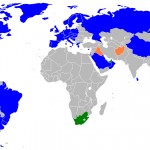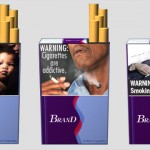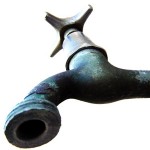 No one should be allowed to intimidate nurses who report serious wrongdoings they observe. When a nurse goes public about improper medical treatment — a doctor who sewed “part of the rubber tip from suture kit scissors to a patient’s torn, broken thumb” and used olive oil on the abscess of a patient with MRSA — she shouldn’t be fired. Read more
No one should be allowed to intimidate nurses who report serious wrongdoings they observe. When a nurse goes public about improper medical treatment — a doctor who sewed “part of the rubber tip from suture kit scissors to a patient’s torn, broken thumb” and used olive oil on the abscess of a patient with MRSA — she shouldn’t be fired. Read more
Misc Links 12/23/10
 Can Congress Make You Buy Broccoli? And Why That’s a Hard Question (NEJM)
Can Congress Make You Buy Broccoli? And Why That’s a Hard Question (NEJM)
Four reasons why it’s hard to answer this question. A legal opinion (12/23)
Doctor Arrested in Whistle-Blowing Case (NYT)
Doctor accused of practicing substandard medicine worked with his friend, the sheriff, to get nurses fired. Nurses vindicated. Doctor now out on bail. (12/23) Read more
Wikileaks, nerd supremacy, anarchy, dictatorship, and democracy
 The flip side of responsibly held secrets … is trust. A perfectly open world, without secrets, would be a world without the need for trust, and therefore a world without trust. What a sad sterile place that would be: A perfect world for machines. Read more
The flip side of responsibly held secrets … is trust. A perfectly open world, without secrets, would be a world without the need for trust, and therefore a world without trust. What a sad sterile place that would be: A perfect world for machines. Read more
Misc Links 12/22/10
 The Hazards of Nerd Supremacy: The Case of WikiLeaks (Atlantic)
The Hazards of Nerd Supremacy: The Case of WikiLeaks (Atlantic)
Substantial, thought-provoking essay by philosopher of the information age, Jaron Lanier
Secrecy May Be Unnecessary for Placebo Effect (WebMD)
Ted Kaptchuk trial involved 80 IBS patients. “There may be significant benefit to the very performance of medical ritual.” Read more
Why the US doesn’t have universal health care
 Most high-income countries today have some form of national health insurance. Why is the US different? What stands in the way? … How to explain American opposition to universal health care. “Nearly every time this country has expanded its social safety net or tried to guarantee civil rights, passionate opposition has followed.” Read more
Most high-income countries today have some form of national health insurance. Why is the US different? What stands in the way? … How to explain American opposition to universal health care. “Nearly every time this country has expanded its social safety net or tried to guarantee civil rights, passionate opposition has followed.” Read more
Misc Links 12/21/10
 Court Backs Patents for Diagnostic Tests (NYT)
Court Backs Patents for Diagnostic Tests (NYT)
A closely watched development in personalized medicine. Patents on tests raise costs and impede medical progress (12/21)
Drug Makers New Targets for U.S. Fraud Inquiries, Report Says (NYT)
Drug industry overtakes defense as main target of federal fraud investigations. Pharma makes so much money by bending or breaking the rules on off-label marketing that the fines are worth it. (12/21) Read more
Why the increase in mental health problems for college students?
 Experts say the trend is partly linked to effective psychotropic drugs (Wellbutrin for depression, Adderall for attention disorder, Abilify for bipolar disorder) that have allowed students to attend college who otherwise might not have functioned in a campus setting. Read more
Experts say the trend is partly linked to effective psychotropic drugs (Wellbutrin for depression, Adderall for attention disorder, Abilify for bipolar disorder) that have allowed students to attend college who otherwise might not have functioned in a campus setting. Read more
Carbs are the new no-no
 To see doctors and nutritionists give voice to so much common sense is truly encouraging. Actually, most of them have been saying something like this all along. Their message to eat a balanced diet just wasn’t titillating enough to get the press coverage it deserved. Read more
To see doctors and nutritionists give voice to so much common sense is truly encouraging. Actually, most of them have been saying something like this all along. Their message to eat a balanced diet just wasn’t titillating enough to get the press coverage it deserved. Read more
Misc Links 12/20/10
 A reversal on carbs (LA Times)
A reversal on carbs (LA Times)
The country’s big low-fat message backfired. The overemphasis on reducing fat caused the consumption of carbohydrates and sugar in our diets to soar. That shift may be linked to the biggest health problems in America today.
Mental Health Needs Seen Growing at Colleges (NYT)
70s students saw college counselors for existential crisis: Who am I? “Now they’re bringing in life stories involving extensive trauma, a history of serious mental illness, eating disorders, self-injury, alcohol and other drug use.” Read more
The day Neda Soltan died: Inside an Iranian hospital
 I tried to explain that my colleagues and I needed to know the cause of the accidents and the nature of the trauma. Then a bearded tall man approached me “ask me!” he said. I immediately recognised the “plainclothes”. “I wanted to know”, I began. He locked his intense hatred into my eyes. “You have no right to ask any question. At least if you don’t want to join them.” And he pointed to the line of the victims lying on the beds and on the floor. Read more
I tried to explain that my colleagues and I needed to know the cause of the accidents and the nature of the trauma. Then a bearded tall man approached me “ask me!” he said. I immediately recognised the “plainclothes”. “I wanted to know”, I began. He locked his intense hatred into my eyes. “You have no right to ask any question. At least if you don’t want to join them.” And he pointed to the line of the victims lying on the beds and on the floor. Read more
Misc Links 12/19/10
 An epidemic of loneliness (Lancet)
An epidemic of loneliness (Lancet)
“Doctor”, she asks, “can you give me a cure for loneliness?” Patients whose only misunderstanding is to have lived to an age when they are no longer coveted by a society addicted to youth.
Tackling loneliness in the holidays (Lancet)
The holiday season is the time of the year when our desire for social contact is most likely to outstrip what our circumstances will allow; it is into this gap that loneliness creeps. Read more
Can Congress Force You to Be Healthy?
 Yes, we want affordable health care. No, we don’t want the government interfering in our personal lives. Don’t get emotionally manipulated into believing we can’t have the first without the second. Read more
Yes, we want affordable health care. No, we don’t want the government interfering in our personal lives. Don’t get emotionally manipulated into believing we can’t have the first without the second. Read more
Misc Links 12/18/10
 The U-bend of life: Why, beyond middle age, people get happier as they get older (Economist)
The U-bend of life: Why, beyond middle age, people get happier as they get older (Economist)
Life improves after the stressful middle years. Interesting comments
Can Congress Force You to Be Healthy? (NYT)
A good point or the wrong question? Virginia judge’s ruling could prove irresistible to the Supreme Court Read more
Character, personality, and cosmetic surgery
 There’s something inherently liberating about realizing there’s nothing actually wrong with you. It’s just an arbitrary message you’ve received all your life. Society controls people’s behavior by making them feel guilty about not being normal, but who gets to decide what’s normal? Read more
There’s something inherently liberating about realizing there’s nothing actually wrong with you. It’s just an arbitrary message you’ve received all your life. Society controls people’s behavior by making them feel guilty about not being normal, but who gets to decide what’s normal? Read more
The death of Wang Bei: Cosmetic surgery as a moral choice
 Each one of us who makes the decision to have cosmetic surgery changes the standards of acceptable appearance in which everyone else must live. In that sense, the decision to have cosmetic surgery is communal and thus ultimately moral. Read more
Each one of us who makes the decision to have cosmetic surgery changes the standards of acceptable appearance in which everyone else must live. In that sense, the decision to have cosmetic surgery is communal and thus ultimately moral. Read more
What we used to eat
 Four Fish: There are many things — in my opinion — that recommend this book. The author has been fishing all his life and is at one with his subject. He doesn’t criticize fishermen, nor is he preachy about what consumers choose to eat. He doesn’t leave his reader with a sense of doom and gloom, a common aftertaste of books that document the extinction of species. Greenberg believes there’s still hope for the future of fish. He’s also a fabulous writer. That’s why I recommend the book highly. Read more
Four Fish: There are many things — in my opinion — that recommend this book. The author has been fishing all his life and is at one with his subject. He doesn’t criticize fishermen, nor is he preachy about what consumers choose to eat. He doesn’t leave his reader with a sense of doom and gloom, a common aftertaste of books that document the extinction of species. Greenberg believes there’s still hope for the future of fish. He’s also a fabulous writer. That’s why I recommend the book highly. Read more
Professionalism of UK doctors questioned over health inequalities
 Where was the medical profession? Doctors are supposed to feel an acute responsibility to deliver the best health service to the whole population. It is on this basis that they ask the public and government to support generous pay increases and terms and conditions of service. These attitudes and behaviours are what we commonly mean by professionalism. It seems that doctors failed completely to live up to the rhetoric of their commitment to professional values. Read more
Where was the medical profession? Doctors are supposed to feel an acute responsibility to deliver the best health service to the whole population. It is on this basis that they ask the public and government to support generous pay increases and terms and conditions of service. These attitudes and behaviours are what we commonly mean by professionalism. It seems that doctors failed completely to live up to the rhetoric of their commitment to professional values. Read more
Candid comments from the medical profession
 In most branches of medicine, we deal more commonly with old people. So we become much more enthusiastic when a young person comes along. We have more in common with and are more attracted to him or her. Doctors have a limited amount of time, so the younger and more attractive you are, the more likely you are to get more of our time. Read more
In most branches of medicine, we deal more commonly with old people. So we become much more enthusiastic when a young person comes along. We have more in common with and are more attracted to him or her. Doctors have a limited amount of time, so the younger and more attractive you are, the more likely you are to get more of our time. Read more
Life expectancy of the rich and the poor
 While average life expectancy is indeed rising, it’s doing so mainly for high earners, precisely the people who need Social Security least. Life expectancy in the bottom half of the income distribution has barely inched up over the past three decades. So the Bowles-Simpson proposal is basically saying that janitors should be forced to work longer because these days corporate lawyers live to a ripe old age. Read more
While average life expectancy is indeed rising, it’s doing so mainly for high earners, precisely the people who need Social Security least. Life expectancy in the bottom half of the income distribution has barely inched up over the past three decades. So the Bowles-Simpson proposal is basically saying that janitors should be forced to work longer because these days corporate lawyers live to a ripe old age. Read more
The post-midterm world
 Conservatives will not find it much easier than liberals to govern a society where so many people feel themselves cheated — and where so many refuse to believe that the so-called experts care for the interests of anyone beyond their narrow coterie and class. Read more
Conservatives will not find it much easier than liberals to govern a society where so many people feel themselves cheated — and where so many refuse to believe that the so-called experts care for the interests of anyone beyond their narrow coterie and class. Read more
Do gruesome graphics deter or promote smoking?
 Bangladeshi chest doctor Kazi Saifuddin Bennoor has seen many misleading cigarette advertisements, but the one that suggested smoking could make childbirth easier plumbed new depths. … “[I]f a lady smokes, her baby will be smaller and it will be easier to deliver, the labour will be less painful“. Read more
Bangladeshi chest doctor Kazi Saifuddin Bennoor has seen many misleading cigarette advertisements, but the one that suggested smoking could make childbirth easier plumbed new depths. … “[I]f a lady smokes, her baby will be smaller and it will be easier to deliver, the labour will be less painful“. Read more
Taking natural foods too far
 The description of Rentokil’s Rodine Rat & Mouse poison includes the following assurance: “Contains natural whole wheat.” Doesn’t this take the sales appeal of healthy ingredients just a bit too far?
The description of Rentokil’s Rodine Rat & Mouse poison includes the following assurance: “Contains natural whole wheat.” Doesn’t this take the sales appeal of healthy ingredients just a bit too far?
What are the mice and rats expected to make of this? Will the mummy and daddy rodents take the poison home and say to their children, “Eat up, it’s good for you. It’s made from whole wheat”? Or are the humans who use the poison supposed to feel good about killing small animals using healthy organic ingredients?
Read more
Tony Judt lives on
 It might be thought the height of poor taste to ascribe good fortune to a healthy man with a young family struck down at the age of sixty by an incurable degenerative disorder from which he must shortly die. But there is more than one sort of luck. To fall prey to a motor neuron disease is surely to have offended the Gods at some point, and there is nothing more to be said. But if you must suffer thus, better to have a well-stocked head. Read more
It might be thought the height of poor taste to ascribe good fortune to a healthy man with a young family struck down at the age of sixty by an incurable degenerative disorder from which he must shortly die. But there is more than one sort of luck. To fall prey to a motor neuron disease is surely to have offended the Gods at some point, and there is nothing more to be said. But if you must suffer thus, better to have a well-stocked head. Read more
An Edgar Allan Poe moment
 The other day, I couldn’t find FuFu after the repairman left. I went out and did errands, came back, and still no FuFu. I walked around the house calling and whistling. The cats dislike whistling, and they usually come running to investigate the sound. Finally I heard a faint meow. I tracked it down to the area where the repairman had been working. It was coming from behind the wall! Read more
The other day, I couldn’t find FuFu after the repairman left. I went out and did errands, came back, and still no FuFu. I walked around the house calling and whistling. The cats dislike whistling, and they usually come running to investigate the sound. Finally I heard a faint meow. I tracked it down to the area where the repairman had been working. It was coming from behind the wall! Read more
Healthy lifestyles serve political interests
 Ultimately, decisions about a country’s health are not a matter of science, medicine, research, or scholarship. They are essentially political choices. When the US leans right, the solution to the health care crisis is to emphasize personal responsibility (aka prevention through healthy lifestyles). When the country leans left, there’s increased interest in the “negative externalities” of advanced market capitalism (pollution, climate change, ethnic inequities). Neither one is exclusively right or wrong. But when the political climate puts the spotlight on patients who are guilty of unhealthy lifestyles, the focus goes dim on those “fundamental mechanisms leading to disease” that have nothing to do with lifestyle. We lose sight of the genuine solutions that an increased focus on those mechanisms could provide. Read more
Ultimately, decisions about a country’s health are not a matter of science, medicine, research, or scholarship. They are essentially political choices. When the US leans right, the solution to the health care crisis is to emphasize personal responsibility (aka prevention through healthy lifestyles). When the country leans left, there’s increased interest in the “negative externalities” of advanced market capitalism (pollution, climate change, ethnic inequities). Neither one is exclusively right or wrong. But when the political climate puts the spotlight on patients who are guilty of unhealthy lifestyles, the focus goes dim on those “fundamental mechanisms leading to disease” that have nothing to do with lifestyle. We lose sight of the genuine solutions that an increased focus on those mechanisms could provide. Read more
The politics behind personal responsibility for health
 Another great example of neoliberal insistence on personal responsiblity: In a 1980 report on the impact of carbon dioxide on climate change – a report requested by Congress – physicist and free-marketer William Nierenberg argued that we should do nothing to prevent climate change because people could simply migrate. “Not only have people moved [in the past], but they have taken with them their horses, dogs, children, technologies, crops, livestock, and hobbies. It is extraordinary how adaptable people can be.” Read more
Another great example of neoliberal insistence on personal responsiblity: In a 1980 report on the impact of carbon dioxide on climate change – a report requested by Congress – physicist and free-marketer William Nierenberg argued that we should do nothing to prevent climate change because people could simply migrate. “Not only have people moved [in the past], but they have taken with them their horses, dogs, children, technologies, crops, livestock, and hobbies. It is extraordinary how adaptable people can be.” Read more
Water privatization in South Africa: Victory and reversal
 Here then, we have the highest court in the land saying that those poor people with pre-paid water meters must not think that their water supply has discontinued when their taps run dry because the meter has cut the supply … they must imagine that it is “temporarily suspended” until such time as they can find the money to buy more water credit or until the next month arrives. Such “logic” … is … an insult both to the poor and to the constitutional imperatives of justice and equality. Read more
Here then, we have the highest court in the land saying that those poor people with pre-paid water meters must not think that their water supply has discontinued when their taps run dry because the meter has cut the supply … they must imagine that it is “temporarily suspended” until such time as they can find the money to buy more water credit or until the next month arrives. Such “logic” … is … an insult both to the poor and to the constitutional imperatives of justice and equality. Read more
Water privatization in South Africa: Prepaid meters
 The supply of water was controlled by prepaid water meters that were installed for each household. Once the “free” allocation was exhausted, the water meters prevented additional water from flowing. That included emergency situations, such as the need to put out a fire. When a fire broke out in Phiri, an urban neighborhood of Soweto in Johannesburg, the outcome was tragic. Read more
The supply of water was controlled by prepaid water meters that were installed for each household. Once the “free” allocation was exhausted, the water meters prevented additional water from flowing. That included emergency situations, such as the need to put out a fire. When a fire broke out in Phiri, an urban neighborhood of Soweto in Johannesburg, the outcome was tragic. Read more
The Cochabamba water wars
 in the developing world, over a billion people lack access to safe drinking water. Many women spend over six hours a day collecting enough water for their families (and wait until after dark to relieve themselves). When it comes to sanitation, 2.6 billion do not even have access to “improved” pit latrines – open pits with simple modifications to reduce flies and odors. Read more
in the developing world, over a billion people lack access to safe drinking water. Many women spend over six hours a day collecting enough water for their families (and wait until after dark to relieve themselves). When it comes to sanitation, 2.6 billion do not even have access to “improved” pit latrines – open pits with simple modifications to reduce flies and odors. Read more
Water privatization: An investment bonanza
 From Buenos Aires to Atlanta to Jakarta, the liquid everybody needs–and will need a lot more of in the future–is going private, creating one of the world’s great business opportunities. The dollars at stake are huge. … Water promises to be to the 21st century what oil was to the 20th century: the precious commodity that determines the wealth of nations. … To turn a profit, [the privatizing corporation] must collect far more in water charges than it pays out in salaries, equipment, and interest. Read more
From Buenos Aires to Atlanta to Jakarta, the liquid everybody needs–and will need a lot more of in the future–is going private, creating one of the world’s great business opportunities. The dollars at stake are huge. … Water promises to be to the 21st century what oil was to the 20th century: the precious commodity that determines the wealth of nations. … To turn a profit, [the privatizing corporation] must collect far more in water charges than it pays out in salaries, equipment, and interest. Read more

